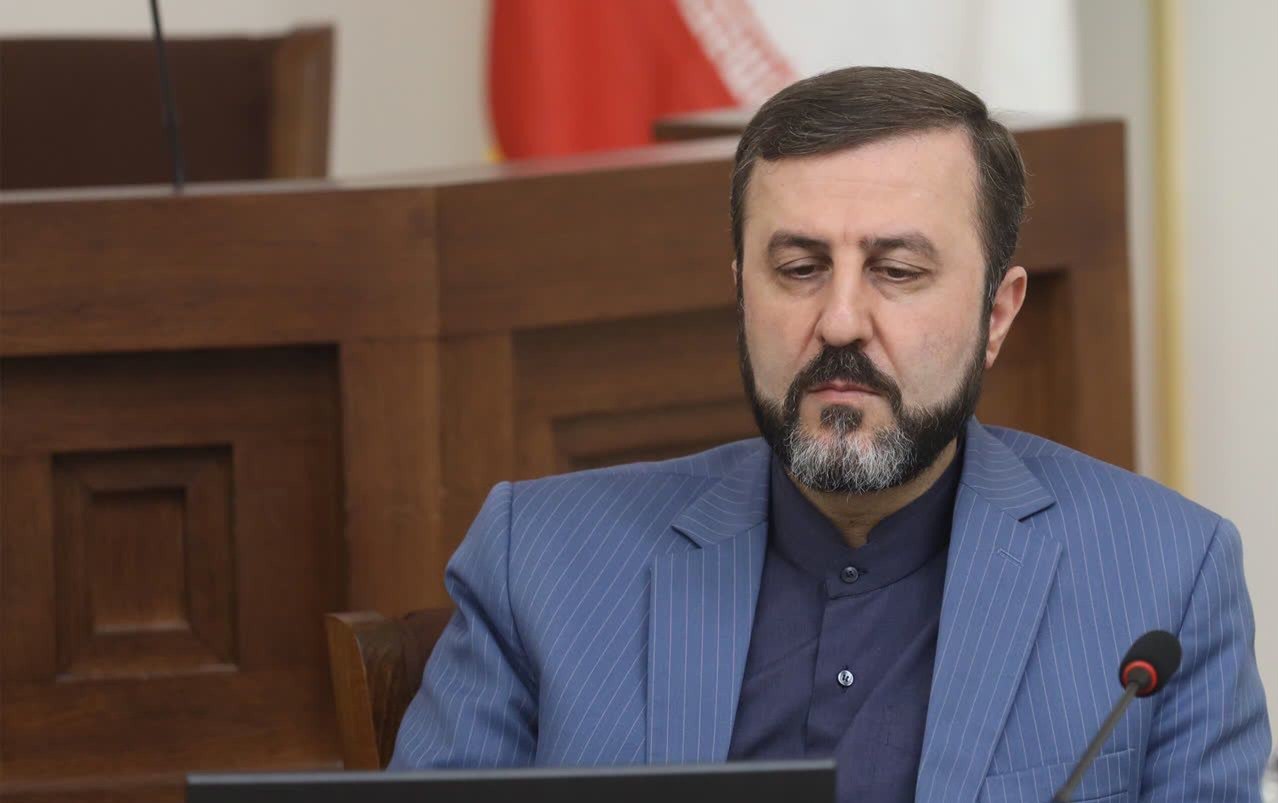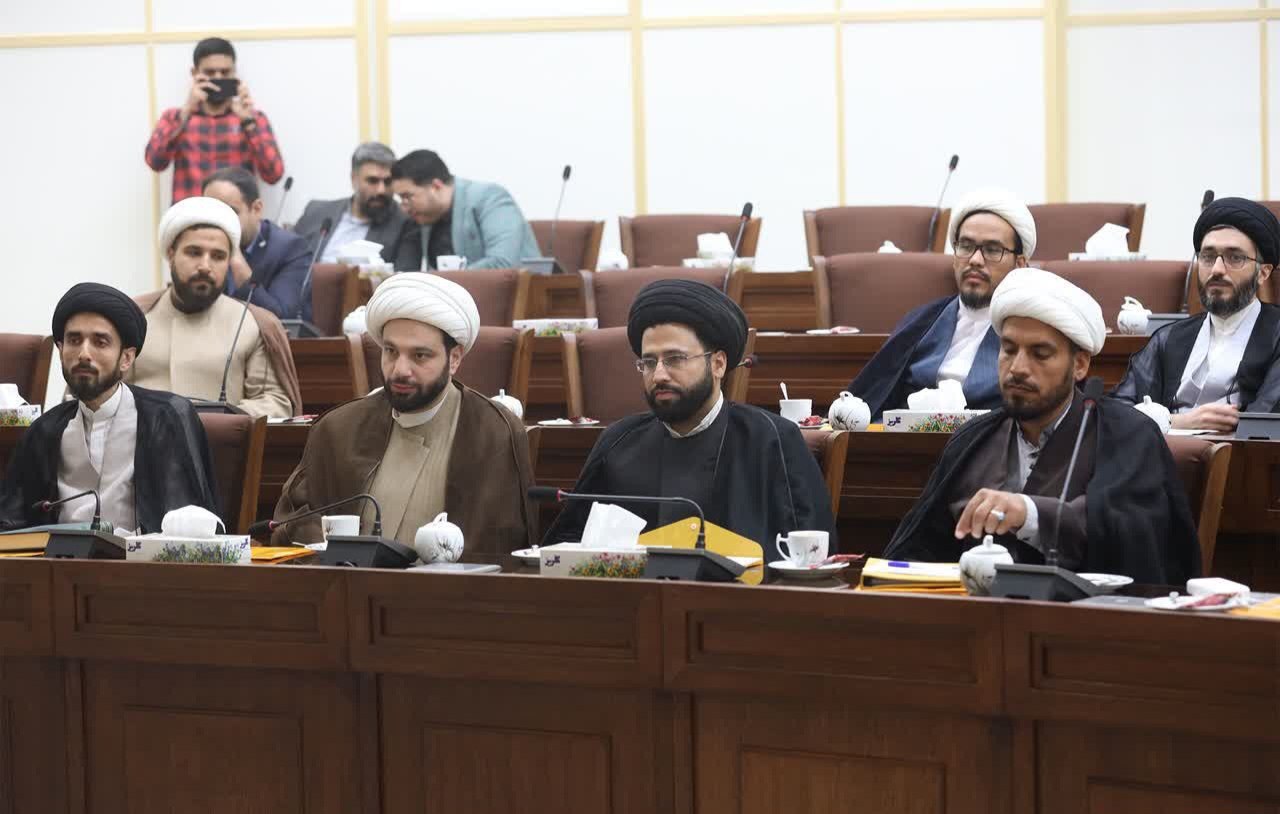HCHR_Kazem Gharibabadi, the Vice President of the Judiciary for International Affairs and the Secretary General of the High Council for Human Rights, at the scientific meeting of jurisprudence, foreign policy and human rights held in Mashhad, while offering his condolences to the martyrs of Ayatollah Raisi, Minister of Foreign Affairs and their companions, stated: “Human rights is a very important issue and covers all aspects of people's lives. Since human rights deal with people's daily lives, it has become an important domestic and international phenomenon”.
Gharibabadi clarified: “Human rights are not only in the political and civil sphere, but also include economic, social and cultural rights. From education to housing, food, health and welfare; nothing is outside the realm of human rights. The fact that Western countries focus on civil and political rights and don’t pay attention to other rights is because they should be accountable for the sanctions they have imposed on the countries or are applying against the countries and also for hindering the development and prosperity of the countries under sanctions”.
Human and citizenship rights are enumerated in the third chapter of Iran's constitution under the title of Nation's Rights
Referring to our country's approach in the field of human rights, the Secretary General of the HCHR noted: “In our opinion, human rights are rooted in religions. Human rights and rights of people have been emphasized in the religion of Islam since more than 14 centuries ago. That not even a single tree should be cut down for no reason, that women, children and the elderly should be protected from aggression during wars, etc., have also been included in the four Geneva Conventions, which is an international humanitarian law field. Another example is that if a person kills an innocent person, it is as if he has killed an entire society, which today is called the right to life”.
Gharibabadi emphasized: “There are many examples in the Holy Quran, Nahj al-Balagheh, Sahifah Sajjadiyyah and Imam Sajjad's treatise on rights, all of which contain high themes of human rights”.
He went on to state that an important part of human and citizenship rights is enumerated in the third chapter of Iran's constitution under the title of Nation's Rights, noting that: “Islam has no problem with human rights. The Western countries created the Universal Declaration of Human Rights and then various covenants and conventions on this matter to realize human rights after killing millions of innocent people in the first and second world wars, while in the religion of Islam human dignity was emphasized 14 centuries ago”.

Cultural differences and diversity should not be ignored in the issue of human rights
The Secretary General of the HCHR further emphasized: “Our problem with the West is in applying double standards, hypocrisy, political actions and trying to impose Western lifestyle and standards as a single model in the field of human rights. There are more than 190 countries in the world and naturally, they have different cultures, regulations and numerous judicial punishment systems. Therefore, cultural differences cannot be ignored”.
He added: “For example, drug discoveries in Iran, due to its neighborhood with Afghanistan and being on the transit route of these substances, are several times more than the discoveries in Western countries, and in some cases it is equal to the whole world discoveries. Should the punishment for drugs in our country be the same as in countries like Norway and Switzerland? Our injuries and threats in this field cannot be compared to the Western ones in any way. They tell us to remove the death penalty, it's like us telling them to bring back the death penalty. The imposition of Western standards is unacceptable to us”.
Referring to the issue of universality in the field of human rights, the Vice President of the Judiciary for International Affairs said: “Western countries believe that all human rights are universal. For example, regarding the right to freedom of expression, clothing, homosexuality, etc., they do not pay attention to cultural diversity. We do not accept Blasphemy. We are not against the universality of certain rights such as the right to life. The right to life should not be taken away arbitrarily. If a person commits a crime, he should be dealt with according to the laws and regulations”.
Western countries even hesitate to say that there is a religious democracy and democracy in Iran
Gharibabadi continued: “Western states suggest that everyone is free in the type of clothing. Maybe these countries want not to wear clothes in the street, should we follow them? Definitely not. We have our own religious and cultural regulations framework and we do not accept the western standards of human rights on other societies. They have been working in the field of LGBT rights for many years. They cannot impose this lifestyle on us and other countries. Another point is the double standards on the part of Western states. They created dozens of human rights conventions and treaties, but why don't they implement them if it is universal? For them, human rights have become a political tool, not a value”.
Gharibabadi added: “See how they react to the movement that has started in the U.S universities and some western countries in support of the Palestinian people. More than 3000 students and university professors were arrested in the U.S. alone. If students' rights and the right to freedom of expression are human rights, why don't they fulfill these rights? In dealing with women and the crimes of the Zionist regime in Gaza and Rafah, we have seen the West's action. Don't children and women have human rights in occupied Palestine? Why did they remain silent in the face of all these crimes and even support them?”
He also stated: “Since the beginning of the Islamic Revolution, people have participated in determining the right of their destiny through elections. Elections are clear manifestations of human rights, democracy and the right to self-determination. Some countries have not had even a single election. Is a resolution be issued against them, have they been sanctioned? Western countries even hesitate to say that there is a religious democracy in Iran. The West both lies and hides the facts about Iran. We have good achievements and progress in the field of human rights, there may be protests in some areas that exist everywhere in the world”.

Iran has accepted 8 million Afghan refugees despite sanctions
The Secretary General of the HCHR continued: “The U.S. has killed more than 7-8 million people since its inception. It has military bases in more than 70 countries. It has occupied several countries in the last decade. How can the U.S. talk about human rights? Immigrants' rights are violated in Europe; after the Syrian crisis, all European countries closed their borders to the immigrants. This is while Iran has accepted 8 million Afghan refugees despite sanctions. The West's discussion with Iran is not about human rights, women's clothing and execution, Iran is anti-colonialist and anti-arrogant and opposes the U.S policies, and for this reason, they do not tolerate it”.
He stated: “The West wants Iran to be a neutral country that has nothing to do with their policies. If we reach this stage, they will no longer criticize our human rights and our nuclear developments. The West has a problem with the existence of the Islamic Republic. If we don't have a problem with their arrogant policies, they will not criticize none of our religious and Islamic foundations either”.
Gharibabadi said: “We are obliged to support and promote human rights in our country and we must ensure people's rights. We must also be active in the field of Islamic human rights and we must develop and present a basic road map of these rights. The Islamic Republic has been able to enter this field by using the capacity of Islamic countries”.
Organizations providing services to people must treat them with respect
The Secretary General of the HCHR stated: “Unfortunately, human rights have been turned into a security issue and this is an important challenge. In Libya and Syria, we saw the intervention of the U.S. and Europeans. Making human rights a security issue appears to be the defense of people's rights, but it has political and security goals in the inside. We should be alert and know why all these attacks appears against us? We should know that the Western countries seek to target our religious, our Islamic foundations and our anti-arrogance policies”.
In the end, Gharibabadi said: “Service providers should treat people with respect. We must make people aware of their rights. Every right comes with a duty; if there is freedom of
expression, it should not be accompanied by insults and contrary to public order, safety and health. In different areas, if public consent is obtained, there will be no disruption to the system”.